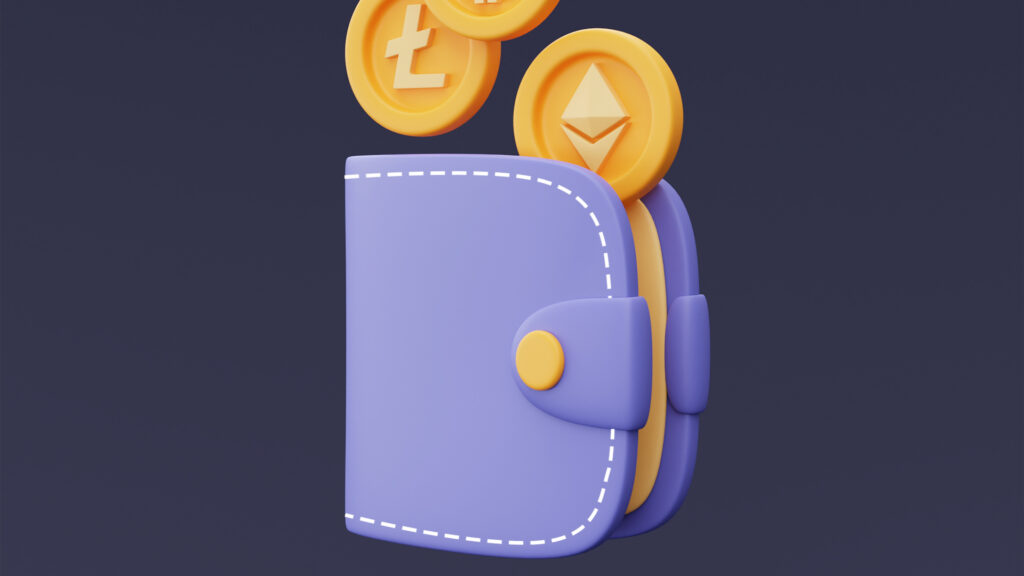A crypto wallet is a service that allows you to securely store your savings and not worry about what might happen to them. This is an indispensable tool for any investor working with the crypto market, and a way to make money for crypto exchanges and startups. In this article, we discuss what a cryptocurrency wallet is, what internal wallets are there, and how to work with offline crypto wallets.
Definition of a crypto wallet
A crypto wallet is a wallet that stores cryptocurrencies. Its meaning is the same as that of a regular wallet with bills. Actually, it does not store the crypto as it is, but the keys that provide access to your USDTs and Bitcoins. We will talk about the keys in crypto transactions later, though. They are more interesting than they might seem at first glance.
The cryptocurrency wallet interacts with the blockchain, and does not just store files like a flash drive. It provides the blockchain network with proof that you own certain tokens. Sure, in this particular case, anonymity is out of the question. However, you need this, if you consider crypto as a serious investment.
How do crypto wallets work?

Cryptocurrency wallets are software, applications, or USB-type external drives. You can store several cryptocurrencies on one wallet, however, there are separate applications for Bitcoin or Ethereum.
Every wallet has a private and a public key. The former is closed, the latter is open. Users can use the public one to send you cryptocurrencies. It is visible to everyone and anyone can use it. However, data about the owner of the address is not available to third-party users. The private key is not available (at least it shouldn't be) to anyone other than its owner; it's anonymous. This key identifies the transactions made by users using the public key and allows you to unlock the received cryptocurrency. So, a person who knows the private key can access all your assets. That is why we do not recommend trusting information about the keys to anyone.
Owners often store private keys in special wallets that are only accessible offline. This eliminates the possibility of attacking the wallet and stealing data. However, a virus can get into the wallet when it is connected to a laptop or other device, so there is still no absolute protection against fraud. They store private keys on custodial and non-custodial wallets; the latter are considered more secure, since the keys stored there are known only to the user themselves. Nevertheless, if you forget your keys, you can only restore them if they were stored on a non-custodial wallet.
Types of crypto wallets
Cryptocurrency wallets are generally divided into hot and cold wallets. Sometimes, people mention exchange wallets — those that are located inside crypto exchanges. Yet, in practice, they are hot wallets.
1. Hot crypto wallet
This is a pretty secure way to store money. It offers custodial and non-custodial storage methods and allows you to restore access to the currency if you forget the keys. However, it is considered the most hackable. It is well suited for daily cryptocurrency transactions, but not for storing large volumes of it. The hot wallet is constantly connected to the Internet. The cold one, on the other hand, can connect to it only at the moment of transferring altcoins to it.
A wallet available on the exchange (which is a type of hot wallet) is considered the most insecure. It is easier to hack, it stores the keys through the custodial method, but allows you to restore access to the cryptocurrency in case of loss. You need such a wallet primarily for trading, and not for storing huge amounts of money. The most famous hot wallets are Exodus and Atomic Wallet.
2. Cold crypto wallet
It is also a safe option with a non-custodial principle of storing crypto assets. It is not connected to the Internet, since it is a hard crypto wallet, the flash drive. Sometimes, a piece of paper with codes written on it can be called a cold wallet. It is immune to hackers, but vulnerable to forgetful users. If you lose the carrier, you are unlikely to get access to your crypto assets with the keys that were stored on it: in order to open the wallet, you will need a PIN code. Such a wallet is well suited for long-term storage of large crypto amounts. Examples of cold wallets are the well-known Ledger and Trezor in the crypto world. True, you will have to dive into cookie jar for them, as the devices cost an average of $100.
3. Online crypto wallet

Are there online cryptocurrency wallets? Yes, there are. All hot wallets can be considered online wallets because they are connected to the Internet. For novice crypto traders, this way of storing currency can be considered one of the most preferable. After all, they are free, you can open them in a split second, and you won’t have to navigate your way through complex structures, since you can understand their interface without a guide. You can find a good description of the exact mechanism of how online wallets work on the Robinhood crypto exchange website.
Safest crypto wallet for beginners
One of the most reliable and secure cryptocurrency wallets for beginners is the Coinbase exchange wallet. This is a free crypto wallet available online. It has a simple interface, stores more than 500 cryptocurrencies for free, allows you to add several layers of protection against scammers and hackers to your profile, and also restores access to lost assets.
The disadvantages of the wallet are the same as those of other hot crypto storages: it can be hacked. Yet, it doesn’t necessarily mean that it will be. Nevertheless, the likelihood of such a turn of events cannot be denied. Still, the exchange within which this wallet operates is attentive to all attempts to hack accounts, so the Coinbase product is a secure crypto wallet. By the way, it also supports NFT and other digital tokens, and works with American banks.
So, if you have an account with a bank located in the States, you can link a crypto wallet to it. This wallet is non-custodial and functions without being bound to an exchange, that is, you may not have an account on it.
Crypto hardware wallet
Among the most popular crypto wallet hardware that stores keys on physical media are Ledger (a pioneer in the world of such services) and Trezor. They look like small flash drives. Experts also recommend taking a closer look at SafePal S1 and D’CENT Biometric Wallet — in some regions they cost less than any other offline crypto wallet. In addition, the D’CENT physical crypto wallet offers to set up access to your assets not through a password, but through biometric data. So far, it cannot or is not faked at the same high quality level as regular PIN codes.
Best crypto wallets
What services can we call the best cryptocurrency wallets? Below are the top popular wallets for users with different levels of knowledge about crypto.
- Guarda Wallet
It is one of the best crypto wallet apps that supports numerous crypto assets. It has an application and a browser extension, which makes it easier to work with it, but sets up a fee for buying currency through its service (and this is the main disadvantage of working with it). Among the advantages are high security, good service, Face ID and multisignature. In some regions, it can exchange fiat money for crypto and vice versa, since its creators received a licence from the Estonian authorities for this.
- Exodus Wallet
This is a multi crypto wallet. It supports more than 180 cryptocurrencies, works with a built-in exchanger and NFT. Moreover, it is a platform for staking, that is, receiving interest for storing cryptocurrencies on your account. It has been operating since 2015, supporting “external” wallets for cold storage of cryptocurrency. It has a closed code (which means that users cannot check the application code for bugs), but its customers are okay with that.
- Electrum
A wallet that can store only Bitcoins. It has been on the market for more than 10 years. It is constantly updated, but it is not suitable for beginners, as you need to figure out how it works. Not only that, but it's open source, and there's no user support, so even if you find it doesn't meet security standards (which is highly unlikely), you'll have to deal with it alone.
- Mycelium
This wallet supports Bitcoin, Ethereum and ERC-20 currency. It combines savings and transaction accounts. Furthermore, it integrates with cold wallets and allows you to buy cryptocurrency directly in the app. However, Mycelium is hardly suitable for beginners: it has a sector-specific interface and is only accessible from a smartphone.
How to get a crypto wallet: online version
To open an online crypto wallet, you need to select an application and download it (or open its website if you log in from a laptop or PC). Then, create an account in it, get (or write it yourself, depending on the software) a private key and buy cryptocurrency or redirect it to this wallet from your other account.
Physical crypto wallet: how to buy
You can buy this kind of crypto wallet on special marketplaces or on the official websites of companies that make such products. We do not recommend buying used wallets: they may be infected with a phishing virus. Buying physical wallets from third-party sites would also be a bad idea. You are not immune to fakes.
Crypto wallet for Android
Below, you can find a list of the best wallet apps for Android devices. You can use them to create a crypto wallet and make transactions.
- Coinbase Wallet
- Coinomi
- Electrum
- Exodus
- Mycelium
- Gemini
- Trust Wallet
Crypto wallet for iOS
Among the best crypto wallet apps for Apple devices are the following providers:
- Coinomi
- Jaxx Liberty
- Coinbase Wallet
- Exodus
- Gemini